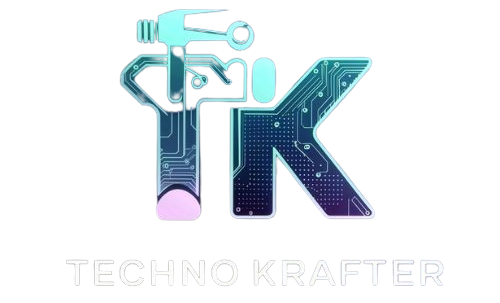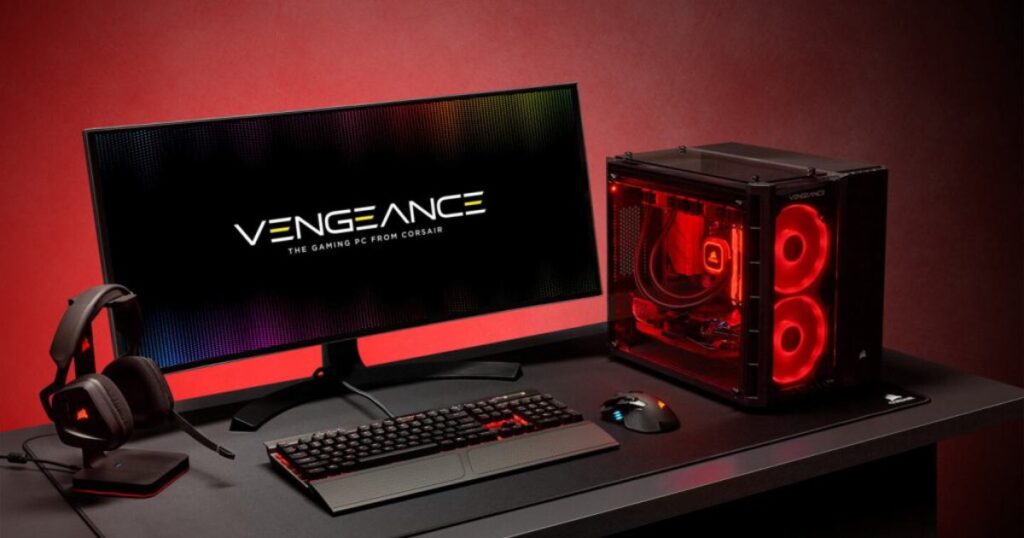A Gaming PC is a computer specifically designed to handle the intense demands of modern video games. Unlike standard PCs, a Gaming PC is built with high-performance hardware that can tackle the latest gaming titles at high resolutions and frame rates.
This type of PC enhances the gaming experience by providing smooth gameplay and stunning visual fidelity.
Key Components of a Gaming PC
When delving into the specifics of what makes a Gaming PC a powerhouse in the world of digital entertainment, it’s crucial to understand the roles and intricacies of its key components. Each part of a Gaming PC is tailored to meet the demanding nature of high-resolution, high-frame-rate gaming environments.
Let’s break down these components to see how they contribute to the overall performance of a Gaming PC.
1. Central Processing Unit (CPU)
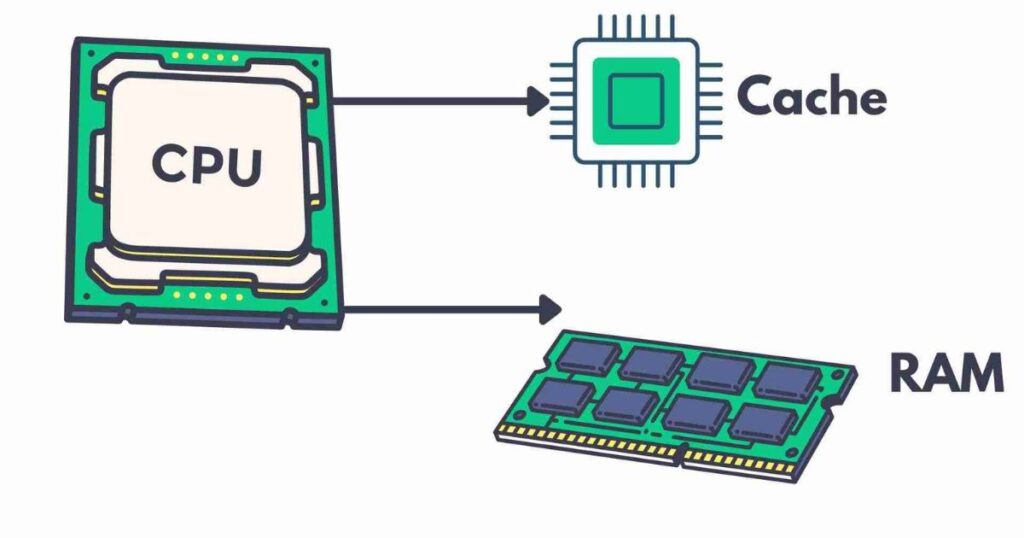
The CPU, often referred to as the brain of the Gaming PC, handles all the calculations that applications need to run. In gaming, the CPU processes everything from game mechanics and logic to player inputs and AI behavior of non-player characters.
A high-speed, multi-core processor is ideal for gaming because it ensures smooth and efficient game play, minimizing lags that can occur in complex gaming scenarios. Popular choices for Gaming PC CPUs include AMD Ryzen and Intel Core series, which offer multiple cores and threads for multitasking and power-intensive gaming.
Relative Post: SNOKIDO UNBLOCKED: THE BEST GAMING DESTINATION
2. Graphics Processing Unit (GPU)
Arguably the most critical component of a Gaming PC, the GPU renders the visual content that gamers interact with on their screens. It translates data from the computer and turns it into understandable images, a process that becomes increasingly complex with high-resolution textures and dynamic lighting effects found in modern games.
A powerful GPU ensures that these visuals are not only stunning but also fluid, contributing to a more immersive gaming experience. High-end GPUs like NVIDIA’s GeForce RTX series and AMD’s Radeon RX series are commonly favored in Gaming PCs for their ability to handle the latest graphical technologies, including ray tracing and 3D acceleration.
3. Memory (RAM)
Random Access Memory (RAM) in a Gaming PC acts as the short-term memory where applications store their data while they are in use. More RAM allows a Gaming PC to handle more complex tasks simultaneously and also affects the ability to run games at higher resolutions or with better graphics quality.
Typically, a Gaming PC should have at least 16GB of RAM to ensure that games and other applications run smoothly without bottlenecking the performance of other components.
4. Storage
For a Gaming PC, storage is split into two types: solid-state drives (SSDs) and hard disk drives (HDDs). SSDs are preferred for their fast read and write speeds, which drastically reduce loading times in games and during system startups.
Many gamers opt for a combination of both: an SSD for installing the operating system and games for quicker loading and an HDD for storing other data where speed is less crucial. The capacity of storage typically ranges from 512GB to 2TB or more, depending on the user’s needs and budget.
5. Power Supply Unit (PSU)
The PSU is crucial as it supplies all other components with the necessary power to function correctly. A reliable and sufficient PSU is vital for maintaining a stable and efficient Gaming PC, especially when running high-end GPUs and CPUs that require more power.
It’s important to choose a PSU with enough wattage to support all components and to consider future upgrades, which might increase the overall power consumption.
6. Motherboard
The motherboard is the hub where all other components connect and communicate. It dictates the Gaming PC’s overall capabilities in terms of data transfer speeds, expansion options, and types of components that can be installed.
A good gaming motherboard will have ample slots for memory and expansion cards, support for the latest CPU sockets, and high-speed connectivity options like USB 3.0 and Thunderbolt for peripherals.
Each component in a Gaming PC plays a critical role in ensuring that gamers receive the best possible experience tailored to their preferences and play styles. Understanding these components helps in making informed decisions when building or upgrading a Gaming PC, ensuring compatibility and performance are maximized to enjoy the ever-evolving world of gaming.
Customization and Upgradeability
One of the biggest advantages of owning a Gaming PC is the ability to customize and upgrade components. Unlike consoles, a Gaming PC can be easily opened up to swap out old parts for newer, more powerful ones. This means that a Gaming PC can evolve over time, keeping pace with the latest technological advancements without needing to be replaced entirely.
Gaming PC vs. Consoles
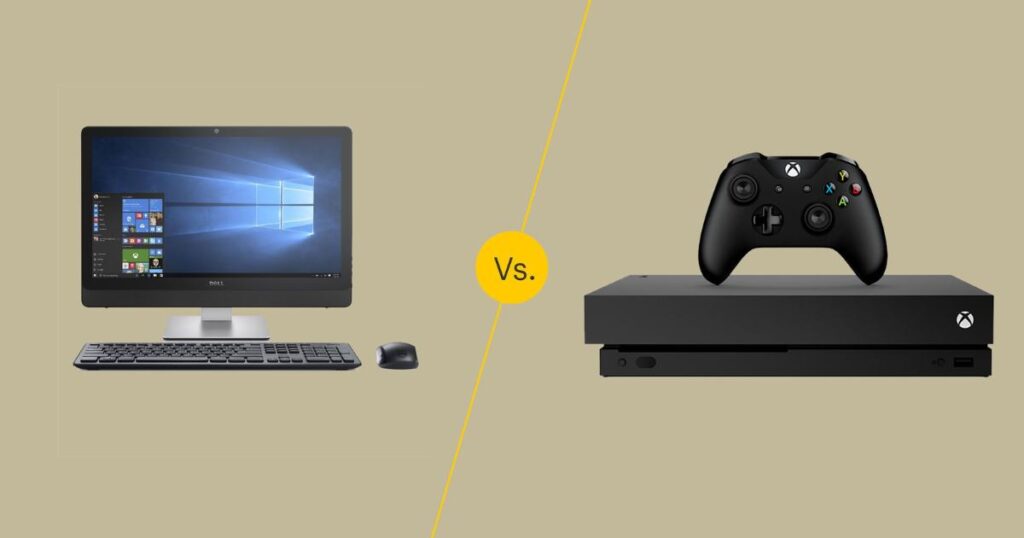
When comparing a Gaming PC to gaming consoles, the Gaming PC often comes out ahead in terms of performance and potential graphics quality. While consoles are designed for ease of use and consistency, a Gaming PC offers a more flexible and powerful platform for gaming. This allows for higher frame rates, better resolution, and overall superior game settings.
Here’s a comparative table that outlines the key differences between Gaming PCs and consoles, highlighting various aspects such as performance, customization, and overall gaming experience:
| Feature | Gaming PC | Console |
| Performance | High-end CPUs and GPUs allow for superior performance; capable of running games at higher resolutions and frame rates. | Generally less powerful than Gaming PCs, but optimized for gaming, offering stable performance at fixed settings. |
| Customization | Highly customizable in terms of hardware and software. Users can upgrade components and modify settings to suit personal preferences. | Limited customization options; hardware upgrades are not possible, and software customization is restricted. |
| Initial Cost | Typically higher initial investment, especially for top-tier configurations. Costs can vary widely based on components. | Lower initial cost with a more uniform price range across different models. |
| Game Library | Extensive game library with access to numerous titles across multiple platforms, including older PC-exclusive games and mods. | Access to exclusive titles not available on PC. Library can be limited by console generation. |
| Upgradability | Components can be upgraded individually to keep up with technological advancements without needing to replace the entire system. | Not upgradable. Users must purchase new consoles to access the latest hardware technology. |
| Multi-Functionality | Can be used for a wide range of activities beyond gaming, such as video editing, software development, and virtual reality. | Primarily focused on gaming, media consumption, and basic online functions. |
| Online Gaming | Typically requires no additional cost for online multiplayer access beyond the game’s purchase. | Often requires a subscription service for online multiplayer gaming (e.g., Xbox Live, PlayStation Plus). |
| Ease of Use | Requires some technical knowledge for setup and maintenance, especially when self-building. | Plug-and-play setup with easy maintenance. Ideal for users who prefer a straightforward, consistent gaming experience. |
| Peripheral Options | Supports a wide range of input devices and has more ports for connectivity. Allows for high-end gaming peripherals that can enhance performance and experience. | Limited to specific controllers and accessories approved by the console manufacturer, although some third-party options are available. |
| Community and Support | Large online communities for troubleshooting, tips, and tricks. Abundant resources for learning and enhancing the PC gaming experience. | Dedicated support from console manufacturers and a cohesive user community focused on specific platforms. |
This table should help illustrate the distinct advantages and limitations of Gaming PCs versus consoles, assisting users in making an informed decision based on their specific gaming preferences and needs.
The Role of Peripherals in a Gaming PC Setup
The peripherals used with a Gaming PC also contribute significantly to the gaming experience. High-resolution monitors, mechanical keyboards, specialized gaming mice, and high-fidelity audio systems can all enhance how games are played and enjoyed. Many of these peripherals are designed to integrate seamlessly with a Gaming PC, providing an immersive and responsive gaming environment.
Gaming PCs and Virtual Reality
Gaming PCs are at the forefront of virtual reality (VR) gaming. With their powerful GPUs and CPUs, Gaming PCs are capable of running VR hardware efficiently, providing an immersive experience that is unmatched by any other gaming platform. This makes a Gaming PC an ideal choice for gamers looking to explore the burgeoning world of VR.
Gaming PCs in eSports
The eSports industry heavily relies on Gaming PCs because of their ability to provide high performance and reliability during competitions. A Gaming PC ensures that players have the least possible latency and the highest possible frame rates, crucial factors in competitive gaming where every millisecond counts.
Building or Buying a Gaming PC
For those interested in owning a Gaming PC, there are two main options: building one from scratch or buying a pre-built model. Building a Gaming PC allows for a higher degree of customization and potentially lower costs, but it requires technical knowledge and time. Buying a pre-built Gaming PC, on the other hand, offers convenience and technical support but can be more expensive.
Gaming PC Communities
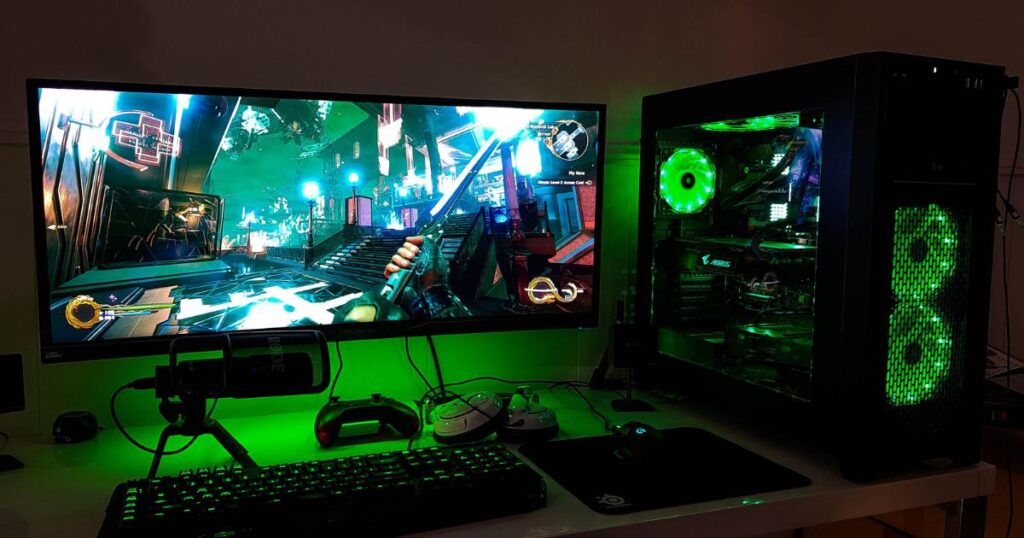
The community surrounding Gaming PCs is vibrant and supportive. Online forums, social media groups, and gaming events are all places where Gaming PC enthusiasts gather to share advice, gaming experiences, and build tips. This community is an invaluable resource for both novice and experienced Gaming PC users.
The Future of Gaming PCs
As technology advances, the capabilities of Gaming PCs continue to grow. Innovations in processing power, graphics, and AI are constantly pushing the boundaries of what a Gaming PC can do. The future of Gaming PCs looks promising, with ongoing improvements that promise even more immersive and engaging gaming experiences.
Benefits of a Gaming PC
A Gaming PC offers a multitude of benefits that cater not only to gaming enthusiasts but also to professionals seeking powerful computing solutions. These benefits go beyond mere performance, touching on aspects of flexibility, customization, and future-proofing that other systems, such as consoles or standard PCs, cannot match.
Let’s explore these benefits in detail to understand why a Gaming PC stands out as a superior choice.
1. Superior Performance
The most immediate benefit of a Gaming PC is its high performance. Designed with cutting-edge technology, Gaming PCs are equipped to handle the most graphically demanding games with ease. This includes smooth gameplay at high resolutions, faster frame rates, and settings turned up to maximum for an immersive experience.
The advanced CPUs and GPUs ensure that games not only look beautiful but also run without lag, providing a seamless and engaging gaming environment.
2. Customization and Upgradability
Unlike many other computing platforms, Gaming PCs offer extensive customization options. Users can build a system that perfectly suits their specific needs and preferences, choosing components based on performance, budget, and aesthetic qualities.
The ability to upgrade components individually allows users to keep their systems up to date without replacing the entire machine. This means that a Gaming PC can evolve with technological advances, making it a long-term investment.
3. Enhanced Multitasking
Thanks to their powerful processors and ample RAM, Gaming PCs are exceptional at multitasking. This makes them ideal for users who need to run complex software applications simultaneously or who stream their gameplay while interacting with viewers. Whether you’re editing video, running multiple applications at once, or streaming content, a Gaming PC handles these tasks more efficiently than standard PCs.
4. Better Gaming Library and Software Compatibility
Gaming PCs have access to an extensive library of games, including both latest releases and classic titles. The compatibility with a wide range of gaming platforms and services, like Steam, Epic Games Store, and GOG, ensures that users have an unmatched variety of gaming content.
Gaming PCs can run other operating systems through virtualization, which further extends their utility and access to a variety of software.
5. High-Quality Graphics and Sound
The quality of graphics and sound is crucial for the full gaming experience, and Gaming PCs excel in both. With the latest graphics cards, gamers enjoy detailed visuals, realistic textures, and advanced lighting effects that games offer. Sound quality is equally enhanced with high-end sound cards and external audio solutions that support surround sound for an immersive audio experience.
6. Competitive Edge in Gaming
For the competitive gamer, a Gaming PC provides the necessary edge to perform at the highest levels. The fast refresh rates, low input lag, and high frame rates are essential for competitive gaming scenarios where every millisecond counts.
7. A Thriving Community
Owning a Gaming PC also means being part of a vibrant and resourceful community. Online forums, social media groups, and gaming events are teeming with Gaming PC enthusiasts who share tips, gaming strategies, and customization advice. This community is a fantastic resource for newcomers and experienced users alike, offering support and camaraderie.
The benefits of a Gaming PC extend far beyond the realms of gaming. They offer a versatile, powerful, and customizable platform that meets the needs of gamers and professionals alike.
Whether it’s the raw power, the ability to upgrade, or the social and competitive aspects of gaming, a Gaming PC is a worthwhile investment that caters to a broad range of computing needs and preferences, making it a top choice for those who demand the best in performance and functionality.
Final Words to gaming pc
A Gaming PC is more than just a tool for playing games; it’s a versatile platform that offers superior performance, customization, and a gateway to a passionate gaming community. Whether you’re a casual player or a professional gamer, a Gaming PC provides the ultimate gaming experience.
